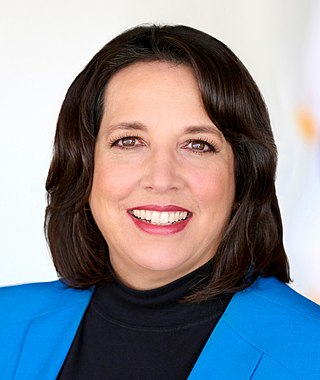The Constitution of the Commonwealth of Massachusetts is the fundamental governing document of the Commonwealth of Massachusetts, one of the 50 individual states that make up the United States of America. It consists of a preamble, declaration of rights, description of the principles and framework of government, and articles of amendment. It is the highest legal authority in the state, subordinate only to the U.S. Constitution.
Chapter 11:Accountability. Chapter 11 of the 1997 Constitution of Fiji is titled Accountability. Its 19 sections, divided into 5 parts, include a code of conduct expected of all government officers and employees, and establish a number of constitutional offices.

The State Auditor of North Carolina is a statewide elected office in the U.S. state of North Carolina. The state auditor is a constitutional officer responsible for overseeing and reviewing the financial accounts of all state government agencies. The auditor also conducts performance audits of state agencies, ensures state agencies' accounting conforms with Generally Accepted Accounting Principles, evaluates the integrity of computer-generated information, and investigates the misuse of state funds or property. The incumbent is Jessica Holmes, who became state auditor on Dec. 16, 2023.
In the Parliament of Australia, a casual vacancy arises when a member of either the Senate or the House of Representatives:

The comptroller of Maryland is a constitutional officer of the U.S. state of Maryland. Thirty-four individuals have held the office of comptroller since 1851, when the office was created. The incumbent is Brooke Lierman, a Democrat.

The Constitution of the State of New Jersey is the basic governing document of the State of New Jersey. In addition to three British Royal Charters issued for East Jersey, West Jersey and united New Jersey while they were still colonies, the state has been governed by three constitutions. The first was adopted on July 2, 1776, shortly before New Jersey ratified the United States Declaration of Independence and the second came into effect in 1844. The current document was adopted in 1947 and has been amended several times.

The lieutenant governor of Massachusetts is the first in the line to discharge the powers and duties of the office of governor following the incapacitation of the Governor of Massachusetts. The constitutional honorific title for the office is His, or Her, Honor.

The state auditor of Minnesota is a constitutional officer in the executive branch of the U.S. state of Minnesota. Nineteen individuals have held the office of state auditor since statehood. The incumbent is Julie Blaha, a DFLer.

The state auditor of Missouri is an elected constitutional officer in the executive branch of government of the U.S. state of Missouri. Thirty-eight individuals have occupied the office of state auditor since statehood. The incumbent is Scott Fitzpatrick, a Republican.

The New York State Comptroller is an elected constitutional officer of the U.S. state of New York and head of the New York state government's Department of Audit and Control. Sixty-one individuals have held the office of State Comptroller since statehood. The incumbent is Thomas DiNapoli, a Democrat.

The Oklahoma State Auditor and Inspector is an elected Constitutional officer for the U.S. State of Oklahoma. The State Auditor and Inspector is responsible for auditing and prescribing bookkeeping standards of all government agencies and county treasurers within Oklahoma. The office in its current form is a consolidation of the office of State Auditor with that of the office of State Examiner and Inspector, both of which dated back to statehood in 1907. The two positions were combined in 1979 after passage of State Question 510 in 1975. Tom Daxon was the first person to hold the combined office and the first Republican as all previous occupants of either position were Democrats.

The Constitution of Latvia is the fundamental law of the Republic of Latvia. Satversme is the oldest Eastern or Central European constitution still in force and the sixth oldest still-functioning republican basic law in the world. It was adopted, as it states itself in the text, by the people of Latvia, as represented in the Constitutional Assembly of Latvia, on 15 February 1922 and came into force on 7 November 1922. It was heavily influenced by Germany's Weimar Constitution and the Swiss Federal Constitution. The constitution establishes the main bodies of government ; it consists of 116 articles arranged in eight chapters.
The Constitution of the State of Maine established the "State of Maine" in 1820 and is the fundamental governing document of the state. It consists of a Preamble and ten Articles (divisions), the first of which is a "Declaration of Rights".

State auditors are fiscal officers lodged in the executive or legislative branches of U.S. state governments who serve as external auditors, financial controllers, bookkeepers, or inspectors general of public funds. The office of state auditor may be a creature of the state constitution or one created by statutory law.
The Constitution of the Philippines is the constitution or the supreme law of the Republic of the Philippines. Its final draft was completed by the Constitutional Commission on October 12, 1986, and ratified by a nationwide plebiscite on February 2, 1987.
The constitutional organizations of Thailand are executive branch agencies of the Government of Thailand, that exist and function outside the Cabinet Ministries of Thailand.
The Commonwealth of Massachusetts is governed by a set of political tenets laid down in its state constitution. Legislative power is held by the bicameral General Court, which is composed of the Senate and House of Representatives. The governor exercises executive power with other independently elected officers: the Attorney General, Secretary of the Commonwealth, and Auditor. The state's judicial power rests in the Supreme Judicial Court, which manages its court system. Cities and towns act through local governmental bodies to the extent that they are authorized by the Commonwealth on local issues, including limited home-rule authority. Although most county governments were abolished during the 1990s and 2000s, a handful remain.

The Constitution of Barbados is the supreme law under which Barbados is governed. The Constitution provides a legal establishment of the Government of Barbados, as well as legal rights and responsibilities of the public and various other government officers. The Constitution which came into force in 1966 was amended in 1974, 1980, 1981, 1985, 1989, 1990, 1992, 1995, 2000, 2002, 2003, 2005, 2007, 2009, 2010, 2018, 2019, 2020 and 2021. The 1966 document succeeds several other documents concerning administration of Barbados. One of them, the Barbados Charter, is discussed in the present Constitution's Preamble. Prior statutes were created for the administration of Barbados as a colony. As a former English and later British colony, the Constitution is similar to those of other former Commonwealth realms, yet distinctly different in the spirit of the Statute of Westminster.

The state auditor of New Mexico is a constitutional officer in the executive branch of government of the U.S. state of New Mexico. Twenty-eight individuals have held the office of state auditor since statehood. The incumbent is Joseph Maestas, a Democrat.
The Government of the U.S. State of Nebraska, established by the Nebraska Constitution, is a republican democracy modeled after the Federal Government of the United States. The state government has three branches: the executive, the legislative, and the judicial. Through a system of separation of powers, or "checks and balances," each of these branches has some authority to act on its own, and also some authority to regulate the other two branches, so that all three branches can limit and balance the others' authority. The State Government is based in Lincoln, the capital city of Nebraska.































